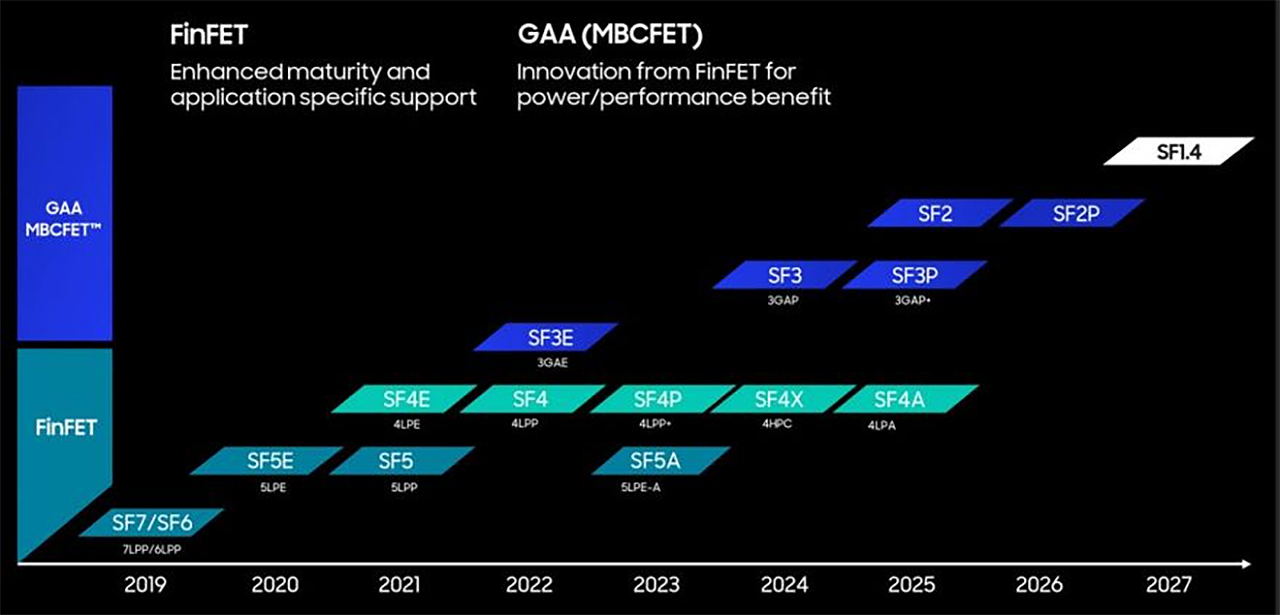Samsung Foundry renames '3nm' process tech to '2nm,' rewrites contract: Report (Updated)
The process formerly known as SF3 has now been renamed to SF2.

Samsung Foundry has reportedly decided to rebrand its 2nd generation 3nm-class fabrication technology, known as SF3, to a 2nm-class manufacturing process called SF2, thus requiring a contract to be rewritten. ZDNet notes that the renaming move could be a way for Samsung to simplify process nomenclature and attempt to better compete against Intel Foundry, at least visually. Intel is set to roll out its Intel 20A production node, which is also a 2nm-class technology, later this year.
In response to the story, Samsung issued a statement stating that since the information about the reported renaming of the SF3 manufacturing technology to the SF2 fabrication process did not come from Samsung, it cannot comment on the matter. Meanwhile, Samsung said that it is going to make some foundry-related announcements in due course.
Samsung's process technology roadmap up through 2027 was unveiled in the fall of 2022 and listed a number of nodes, including SF3E, SF4P, SF3, SF4X, SF2, SF3P, SF2P, and SF1.4. Apparently, since early 2024, Samsung has notified its customers about changes in its roadmap and the renaming of SF3 to SF2. The company reportedly went as far as re-sign contracts with customers who intended to use the SF3 production node.
"We were informed by Samsung Electronics that the 2nd generation 3nm [name] is being changed to 2nm," a source told ZDNet. "We had contracted Samsung Foundry for the 2nd generation 3nm production last year, but we recently revised the contract to change the name to 2nm."
Samsung intends to start making chips based on what is now called SF2 in the second half of 2024. Given that a customer reportedly had to rewrite a contract that reportedly only renamed process technology, it would appear that Samsung's SF3 has indeed been renamed to SF2 without any changes — it would be impossible to use a different process technology to make a chip designed for SF3 without reworking the design.
While this information is currently unofficial and doesn't come directly from Samsung, it corroborates a rumor that emerged earlier this year that Samsung was set to make an AI processor for a Japanese startup using its 2nm-class process technology in 2025.
Samsung's SF3 technology uses gate-all-around (GAA) transistors that Samsung brands as Multi-Bridge-Channel Field Effect Transistors (MBCFET). SF3 (now SF2) does not feature a backside power delivery network (BSPDN), a major disadvantage compared to Intel's 20A process technology that introduces both GAA transistors and a backside power delivery network for higher performance and energy efficiency.
Samsung Foundry has reportedly communicated this change to its customers and partners since the start of 2023, following discussions that began in late 2022. If the process formerly known as SF3 is now being renamed to SF2, we suspect further name changes will cascade down Samsung's roadmap and that the former SF2 node will get a new name as well.
Update 3/6/2024: Added Samsung statement.
Get Tom's Hardware's best news and in-depth reviews, straight to your inbox.

Anton Shilov is a contributing writer at Tom’s Hardware. Over the past couple of decades, he has covered everything from CPUs and GPUs to supercomputers and from modern process technologies and latest fab tools to high-tech industry trends.
-
nogames Isn't that cheating? But "following industry trends" are they all cheating with this then?Reply -
Sluggotg The naming of these modern very small nodes does remind me a bit of Stereo Amplifiers for cars in the 70's and 80's. The power ratings became meaningless. They would claim 200watts but could only put out like 80watts at the most, if your lucky.Reply -
Giroro Reply
Yes, and yes.nogames said:Isn't that cheating? But "following industry trends" are they all cheating with this then?
Especially Intel. -
kjfatl Reply
Don't blame Intel. They were the last holdout of real numbers and their stock price plummeted.Lorien Silmaril said:Thanks to Intel, everything is now retarded.
Intel recently aligned their process names with those at Samsung and TSMC. Tit for tat, next week TSMC will be naming their 3nm process 10a.
This is all about fooling investors and uninformed consumers. -
JarredWaltonGPU Reply
Technically, I think Samsung was the one that started the "marketing process names" trend. Its "22nm," "14nm," and "10nm" nodes weren't equal to the competition's similarly named nodes IIRC.kjfatl said:Don't blame Intel. They were the last holdout of real numbers and their stock price plummeted.
Intel recently aligned their process names with those at Samsung and TSMC. Tit for tat, next week TSMC will be naming their 3nm process 10a.
This is all about fooling investors and uninformed consumers. -
MBOO7 So wait, let me sum thiis up. You are saying, Intel is the honest one of them all?Reply
:unsure:
🤭
:ROFLMAO::ROFLMAO::ROFLMAO::ROFLMAO::ROFLMAO::ROFLMAO::ROFLMAO: -
hotaru251 Reply
no as the entire "nm" naming has no real guidelines anymore.nogames said:Isn't that cheating? But "following industry trends" are they all cheating with this then?
hence why amd & intel's 10 & 7 were differnt nm, but their technically in same class.
you could name it gitgud nm & be fine as the naming hasnt meant anything for liek a decade. -
Notton If Samsung were some unscrupulous seller on amazon, they would claim 0.002nm, knowing full well no ordinary customer could prove it.Reply
Who has a one million dollar electron microscope they are willing to lend for free?
oh, and even if you do prove it, they'll probably just knife you. -
vertuallinsanity Just...no! Extra steps.. Same as Intel, Someone is laughably trying to sew seeds of confusion.Reply
Neither company would muddle their nomenclature to create added work for their customer's understanding of process, nodes or fabs.
Re-signing contracts involving additional internal and external legal resources?
hahhHhahhhahAaAAAAaaa! No.. -
Alvar "Miles" Udell Honestly I'm surprised they all haven't changed to the "simple" naming systems like the WiFi Consortium and Qualcomm did (Wifi 6, 7, and Snapdragon 8 Gen 1, 2, 3, 4), or maybe they're all waiting for the Angstrom Era and we'll see Samsung Angstrom Gen 1 or Intel Advanced Process 1st Generation.Reply
